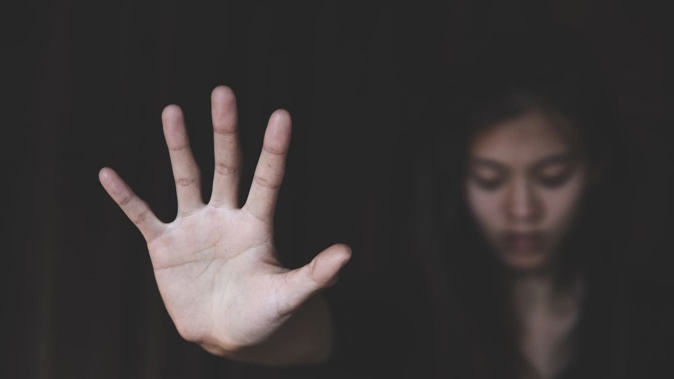
WARNING: This story refers to sexual assault.
Yesterday a Christchurch schoolboy told a Youth Court judge he “does not deny” sexual offending against three teenage girls.
He had been on trial since Monday, defending multiple charges of raping and violating the girls - two of them recent ex-girlfriends.
But on day four of the trial, amended lesser charges were put to him that he did not deny.
As the unexpected resolution played out in the courtroom, his victims sat silently and watched.
One of them was shaking like a leaf - a mix of her trauma, the gruelling court process and her relief it was over.
Afterwards, she and her father spoke to senior journalist Anna Leask about their journey to justice.
By law, the Herald can only report the basic details of the Youth Court proceedings - but the victim’s experience of the process and her message to other young people can be published in full.
She was 15 when it happened.
She’d never had sex - and knew she did not want to.
She wasn’t ready, she wasn’t comfortable with her body and she wanted to wait until the time was right and she was with someone special.
But one day in April 2023, her right to choose was taken from her.
She had been in a relationship with the offender for about three months but they had broken up. They remained in contact and on good terms.
So, when he invited her to his place she had no qualms.
When she arrived he and his mates were watching sport. He asked her to go to his bedroom and she agreed.
She agreed to lie on his bed. She agreed to kissing.
He took off his pants and she didn’t protest when he pulled hers off.
Then everything went uncontrollably wrong.
“Do you want to f**k?” he asked her.
She replied : “I don’t know, I’m scared.
“Would you be mad if we didn’t?”
He said no - but then immediately penetrated the girl.
He told her he was “just seeing if it fits first”.
 The four girls reported their experiences with the youth to police. He was later charged and went on trial in the Youth Court this week. Photo / George Heard
The four girls reported their experiences with the youth to police. He was later charged and went on trial in the Youth Court this week. Photo / George Heard
Soon after, she told her sister what happened and together they disclosed the incident to a school staff member.
The girl was then taken for a specialist sexual assault medical examination and her father took her to make a police complaint.
The teen was charged with rape. He denied that, but did not deny a lesser charge of sexual connection with a person under 16.
“(She) did not consent, however, it is accepted that he may have believed she did consent,” the Crown prosecutor said in court yesterday.
The change in trajectory came after the girl had given evidence.
She was then allowed to sit in the courtroom as the case was resolved by Judge Ian Mill.
“It was really hard, but it was a good way for me to get closure and to see someone held to account.
The young victim said the court process was “horrible” but she was pleased she went through with it.
“It was important to me to make sure he was stopped… from doing it to anyone else. I would have regretted not coming forward,” she said.
“It has been a rollercoaster but I got my power back.
She hoped her experience would be a valuable lesson to others about consent.
“Some boys need their memories refreshed on that,” she said.
“Implied consent is not enough. For you to go forward without even asking ‘are you sure?’ or ‘do you want to?’ is not ok.
“Even if you think you have consent - you need to be sure.”
She encouraged other young people to disclose abuse and trust the process.
“It’s absolutely worth it,” she said.
“It’s hard but you get through it.”
 The girl said she was worried about being questioned in court but knew she had to go through with the process and stand in her truth. Photo / 123rf
The girl said she was worried about being questioned in court but knew she had to go through with the process and stand in her truth. Photo / 123rf
She told the Herald that before court, she was invited to meet the judge and appreciated the chance to speak to him.
She was worried about her version of events being challenged and questioned.
“I told the judge I just wanted to be heard,” she said.
“Being questioned is a horrible experience but you have to know your truth and you have to stand with your truth.”
She said it was “important” to be in court when the offender had the amended charges put to him.
“Hearing him verbally say that he did not deny it - I think that’s a big part of closure,” she said.
Her father said he felt “washed out” after “a very long 18 months”.
“It has been heartbreaking,” he said.
He remembers the day he found out his daughter had been assaulted.
He got a call from a staff member at her school who said the girl was in her office.
“She has advised me she has been raped,” the staffer told her father.
He raced to meet his daughter at the Cambridge Clinic where she underwent the forensic medical examination.
“She was scared to tell me... scared of what I would say,” he said.
“I deeply admire these girls for saying ‘enough is enough’... all I want is for people to report these things to police - even if they don’t want it to go further. Doing something is better than doing nothing.
There was - and never has been - any doubt in his mind about her account.
“Absolutely no question,” he said.
“I brought my girls up to be honest and straight up - and they are.
“I am disappointed that the offender wouldn’t do the right thing, wouldn’t speak the truth and wouldn’t own his actions from the start. He didn’t do that until the last minute.
“He put everyone through a year of hell.”
He was extremely proud of his daughter - and the other victims.
“They have been so strong, they are brave individuals standing up to him like this,” he said.
Before the trial he was worried that his daughter’s account would be questioned, that she could be accused of lying or “colluding with the others” and pressed on intimate details of her life.
“It was frustrating… hard to think your daughter is going to be treated like the enemy,” he said.
“You feel helpless… I am a single father and I am just so lucky her older sisters were able to help support her.”
 The teen told her sister about the assault and then her father took her to make a police complaint. Photo / 123rf
The teen told her sister about the assault and then her father took her to make a police complaint. Photo / 123rf
The family also had the support of independent victim advocate Ruth Money.
After his daughter went to police, the father had no clue what to expect or how to move forward. He said there was a distinct lack of information and advice from anyone and desperate for guidance, he contacted his local MP.
The MP suggested Money and the father reached out to her.
“She was an absolute lifesaver - we would have been buggered without her,” he said.
“We felt really, really let down… we felt that initially the police were completely hopeless and her school offered no support at all.
“Without an advocate, I don’t know how the hell the girls would have done this - we would have been flying blind.”
He spoke to the Herald because he wanted to see more education around consent and sexual assault - in families, schools and the wider community.
“The community definitely needs educating around types of sexual violence - it’s not like what you see in the movies with stranger rapes in dark parks.
“People need to know what sexual violence really looks like and how people react to it… so many young people don’t really know what it is, and what to do about it.
“We have to encourage girls to come forward if this has happened to them and we need to support them better.”
“My advice to other dads, parents? Educate, listen and support.
“We will never stop sexual crime but we can help with awareness and education out young to respect consent. Educate your children to respect others.”
What is consent?
A person consents to sexual activity if they do it actively, freely, voluntarily and consciously without being pressured into it.
A sexual assault is ANY unwanted sexual contact that you don’t consent to.
What is not consent?
Not resisting.
- A person does not consent to sexual activity just because they do not protest or physically resist the activity.
- A person does not consent to sexual activity if they allow it because of physical force, or threats, or the fear of force.
Being impaired
- A person does not consent to sexual activity if it happens while they are asleep or unconscious.
- A person does not consent to sexual activity if it happens while they are so drunk or drugged that they cannot consent or refuse.
- A person does not consent to sexual activity if it happens while they are affected by an intellectual, mental, or physical condition to such an extent that they cannot consent or refuse.
Misunderstanding
- A person does not consent to sexual activity with another person if they allow it because they are mistaken about who the other person is.
- A person does not consent to an act of sexual activity if they allow it because they did not understand what was happening. For example: a person who consents to a smear test or prostate examination by a professional, does not consent to them doing something to them sexually that is not part of the test.
(SOURCE: NZ Police)
Anna Leask is a Christchurch-based reporter who covers national crime and justice. She joined the Herald in 2008 and has worked as a journalist for 18 years with a particular focus on family violence, child abuse, sexual violence, homicides, mental health and youth crime. She writes, hosts and produces the award-winning podcast A Moment In Crime, released monthly on nzherald.co.nz
SEXUAL HARM
Where to get help: If it's an emergency and you feel that you or someone else is at risk, call 111. If you've ever experienced sexual assault or abuse and need to talk to someone, contact Safe to Talk confidentially, any time 24/7:
• Call 0800 044 334
• Text 4334
• Email [email protected]
• For more info or to web chat visit safetotalk.nz
Alternatively contact your local police station - click here for a list.
If you have been sexually assaulted, remember it's not your fault.
Take your Radio, Podcasts and Music with you









